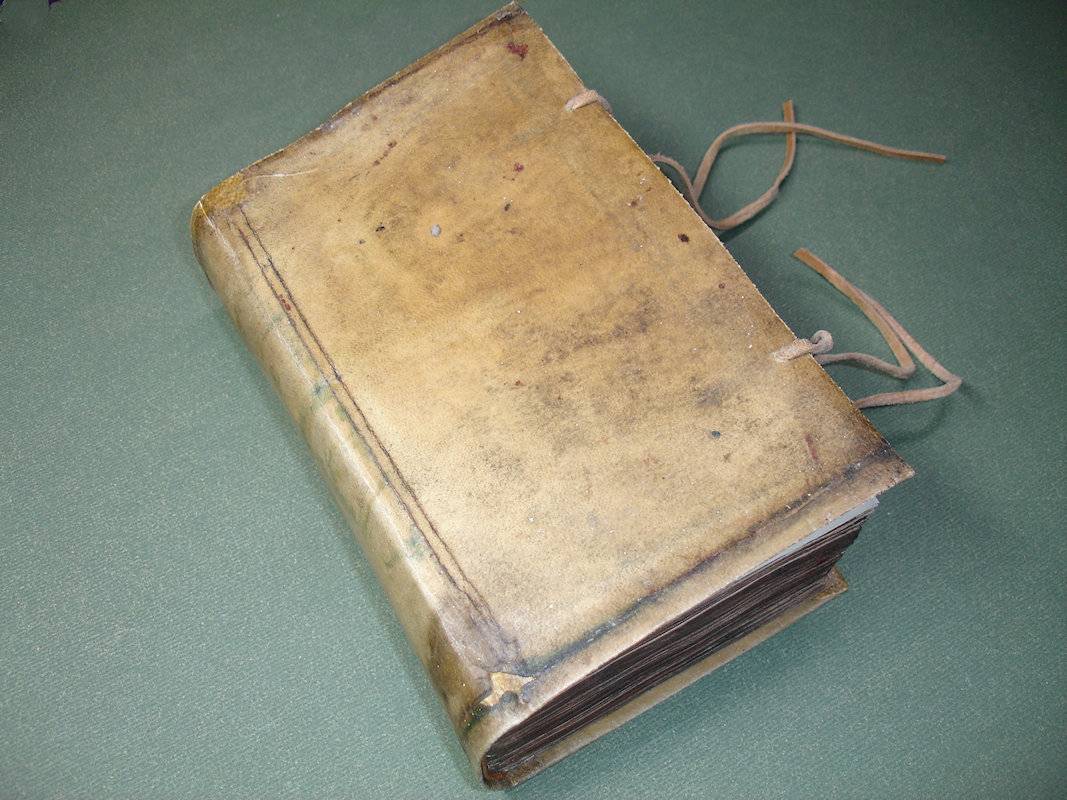SCALIGER,J.J. Illustriss. viri Iosephi Scaligeri, Iulii Caes. à Burden F. Epistolae omnes quae reperiri potuerunt, nunc primum collectae ac editae. Caeteris praefixa est ea quae est De gente Scaligera; in qua de autoris vita; & sub finem Danielis Heinsii De morte eius altera.
Leiden (Lugduni Batavorum), Ex officina Bonaventurae & Abrahami Elzevir, 1627.
8vo. (XXIV),887,(1 blank) p. Limp restored vellum 18 cm (
Ref: STCN ppn 840010095; Willems 288; Berghman 1393; Rahir 253; Smitskamp Scaliger Collection 166; Graesse 6/2,289; Ebert 20438) (
Details: Elsevier's printer's mark on the title, depicting an old man who stands in the shade of a vine- elmtree, symbolising the symbiotic relationship between scholar and publisher; the motto: 'Non solus', probably indicates the interdependency of publisher and scholar) (
Condition: Binding recently restored antique style. Vellum soiled. Endpapers renewed. Old and small ownership entry on the title. Edges of the title and last leaf, and the tip of the upper corner of first & last 2 leaves skillfully restored. Last 2 leaves slightly soiled. Some faint pencil) (
Note: The place of Josephus Justus Scaliger, 1549-1609, in the history of classical scholarship is royal. His preeminence is summarized masterly in the blurb text of the dustjacket of the intellectual biography of Anthony Grafton 'Joseph Scaliger, A study in the history of classical scholarship', Oxford, 1983/93. 'In an age of great classical scholars, Joseph Scaliger was the greatest. His early work as an editor of Latin texts won the attention of the learned throughout Europe and contained technical innovations that remain of interest. His later work as the founder of the discipline of historical chronology involved him in the superhuman task of trying to reconstruct every sophisticated calender and to date every significant event in human history. Along the way he emended hundreds of corrupt passages in classical texts, collated scores of manuscripts, quarrelled with dozens of his rivals, failed humiliatingly (...) to prove that he was descended from the della Scala of Verona - and dashed off in his spare time works that would remain standard for centuries, like Gruter's Corpus of inscriptions, the publication of which Scaliger oversaw. His work was perhaps most important in that it showed that the Bible and the events it recorded could not be understood except in the light of the writings of the pagans and the methods of classical scholarship'. In 1593 he filled the vacant place left by Justus Lipsius at the young the University of Leiden. 'His disinclination to lecture was duly respected; all that the authorities at Leyden desired was his living and inspiring presence in that seat of Protestant learning' (Sandys p. 202). On this honorary post he produced works that made him immortal, and lend lustre to Leyden and its Universtiy. Scaliger spent the last 16 years of his life in Leiden as the jewel of the University. There he enjoyed also the friendship of a great numbers of pupils and admirers. To his circle belonged H. Grotius, D. Heinsius, the Dousae, and in France Du Thou and Casaubon. Scaliger died in the arms of his favourite pupil and closest friend Daniel Heinsius, who wrote a funerary oration for him. The correspondence reflects his relations with contemporary scholars and scientists, and the scholarly circles in which he moved. He corresponded with Salmasius, Heinsius, Casaubon, Lindenbrogius, Gruter, Lipsius, Labbaeus and many others. Scaliger had inherited from his father Julius Caesar Scaliger a profound belief in his descent from the noble Veronese family Della Scala. The correspondence opens with a 58 page letter addressed to Dousa, and is on this matter, 'De vetustate gentis Scaligerae in qua & de vita utriusque Scaligeri'. Here Scaliger tries to prove his princely descent) (
Provenance: Old ownership entry on the title of one 'J. Bridges', who also contributed some small marginalia in a clear and legible hand) (
Collation: *8, 2*4; A-3I8, 3K4) (Photographs on request)
Book number: 130434 Euro 450.00
Keywords: &catbiografie, (Oude Druk), (Rare Books), Altertum, Altertum, Altertumswissenschaft, Antike, Antiquity, Briefe, Correspondence, Dutch imprints, Epistulae, Geschichte der klassischen Philologie, Letters, Scaliger, classical philology, epistolae, history of classical scholarship
 SCALIGER,J.J.
SCALIGER,J.J.

